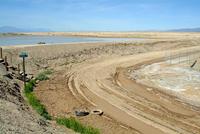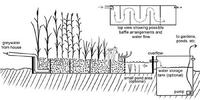-
Sea power: extracting energy from ocean waves

As sources of renewable energy, sun and wind have one major disadvantage: it is not always sunny or windy. Waves in the ocean, on the other hand, are never still. Researchers are now aiming to use waves to produce energy by making use of contact electrification between a patterned plastic nanoarray and water.
-
-
Bipartisan cybersecurity measure to be introduced in Congress
Senator Saxby Chambliss (R-Georgia) last week said he was “very close” to introducing legislation which would encourage the private sector and government agencies to share information regarding cyberattacks. Chambliss has proposed a government “portal,” operated by DHS, to handle information coming from the private sector. Privacy advocates welcome the proposal for a civilian agency like DHS to operate the information sharing “portal” (in earlier versions of proposed cybersecurity legislation, the NSA was tasked with a similar coordinating responsibility).
-
-
ACS: Shutdown undermines U.S. innovation, competitiveness, critical services
American Chemical Society (ACS) president Marinda Li Wu said that the budget impasse is effectively choking America’s science innovation pipeline, strangling new discoveries, future economic growth, and job creation. “[T]o shut down a critical part of our nation’s research and innovation pipeline puts our nation at a severe competitive disadvantage globally,” said Wu. “A government shutdown that closes the world’s largest research system can lead to unintended negative consequences putting at peril America’s economic growth and long-term stability.”
-
-
Research investments, growing markets drive rise in energy patents

Innovation in energy technology is booming, according to a new paper which examines what factors set the pace for energy innovation. The study finds that investments in research and development, as well as in the growth of markets for these products, have helped to spur this dramatic growth in innovation.
-
-
Debate heats up over N.Y.’s Indian Point nuke license renewal
Indian Point nuclear power plant, located twenty-four miles north of New York City, provides 25 percent of the power used in New York City and Westchester County. The plant’s two reactors were built four decades ago, and the plant operator is seeking a 20-year license renewal for them, or they will have to be shut down. Opponents of the license renewal point to the risk inherent in operating aging reactors – and to a recently discovered risk: Indian Point is located near two active seismic areas — the Ramapo Fault Plain and the Peekskill-Stamford line.
-
-
Popular e-commerce software vulnerable to hackers
Online transactions rely on a trusted third party, or “cashier,” who bridges the gap between vendors and their customers. The use of a third party cashier, however, also complicates the payment logic and introduces a new class of vulnerabilities that can result in significant financial losses to merchants. Computer scientists found flaws in e-commerce software that allowed them to purchase stationery, candy, and toys online at below their correct cost.
-
-
Crumbling infrastructure hobbles U.S. competitiveness

America’s infrastructure has long been denied the investment and attention needed from public and private entities to remain competitive in an ever-growing global economy. U.S. roads, bridges, power plants, airports, utilities, and other critical infrastructure were once the envy of the world. The post-Second World War golden era (that is, golden era as far as investments in infrastructure are concerned) has come to an end, and fewer resources are committed to improving and maintaining the country’s infrastructure.
-
-
Arktis closes $2 million financing round
Zürich, Switzerland-based Arktis Radiation Detectors Ltd., developer of a proprietary fast neutron detection technology which offers an innovative detection method for discovering well-shielded nuclear materials, successfully closed a round of financing worth $2 million.
-
-
Rural California country faces levee dilemma

About 400 homes and rich farmland in District-10 of Marysville, California risk being flooded should the levees protecting the area fail. The levees, stretching over twenty-eight miles, were built in the early 1900s. The area’s low population may be one reason why county officials have neglected making improvements to the levees in District-10. Local opponents of investment in shoring up the levees are worried that if the levees are improved and the area made safer, “It would open the door for more agribusiness type things, but it would also open the door for more subdivisions,” in the words of one of them.
-
-
USAF partners with national labs to improve aircraft component design
Working with national laboratories, universities, and industry, the Air Force is ensuring it stays on the cutting edge of global security by creating a new engineering paradigm to improve the safety and fuel-efficiency of aircraft.Materials research engineers at the Air Force Research Laboratory (AFRL) have partnered with national laboratories to model defects and study materials at their grain level in an effort to develop and advance the design of systems used by the military personnel, including aircraft.
-
-
Aerospace and Defense Industry says its member companies negatively affected by shutdown
The Aerospace Industries Association called on Congress and President Obama to pass a bipartisan solution that reopens the government as soon as possible. The association’s president said that the negative impacts of the shutdown range from industry worker furloughs on programs that support the soldiers to delays in new aircraft certification and space systems launches.
-
-
Free-market solution to the immigration problem
Supporters of a free-market approach to the immigration problem advance the “Red Card Solution,” a system to issue short-term unlimited guest worker visas. The system calls for private businesses to operate labor offices inside the United States and abroad, in which foreigners could apply for jobs. Hired applicants would be given a temporary red card to enter the United States and work with the security of legal worker status, and the understanding that they would leave the country upon completion of the job. Under the Red Card Solution, only applicants who have passed a criminal background check and secure legitimate employment would be granted worker status.
-
-
Helping farmers plow through new, complex food safety regulations
The recently passed Food Safety Modernization Act set safety standards on how farmers grow, harvest, and handle fresh produce to reduce the risk of foodborne diseases. The new regulations to minimize food safety risk include testing for water safety and better managing manure storage. Agricultural extension educators should take a flexible approach in teaching farmers about the changing landscape of food safety regulations, researchers say.
-
-
Bolstering water security in a crowded world

With limited water and the increasing number of people depending on it – there will be more than nine billion people on the planet by 2050 — water security is tenuous. Integrated water management plans using “blue,” “green,” and “gray” water, however, can increase water security by allowing agriculture to rise to the challenge of feeding a growing world population while leaving enough water for other uses.
-
-
Serious IT consequences if shutdown lasts
The shutdown of the federal government, if it lasts no more than a week or so, will not seriously damage government IT operations, experts and industry insiders say. A longer shutdown, which would lead to extended furloughs for non-essential employees, will have more serious effects, as it will further depress the federal technology workforce and will deter top graduates from applying for government jobs. If Congress refuses to allow payment to furloughed employees for the time they were idled, the effect will be even more pernicious, these experts said.
-
More headlines
The long view
Factories First: Winning the Drone War Before It Starts
Wars are won by factories before they are won on the battlefield,Martin C. Feldmann writes, noting that the United States lacks the manufacturing depth for the coming drone age. Rectifying this situation “will take far more than procurement tweaks,” Feldmann writes. “It demands a national-level, wartime-scale industrial mobilization.”
Trump Is Fast-Tracking New Coal Mines — Even When They Don’t Make Economic Sense
In Appalachian Tennessee, mines shut down and couldn’t pay their debts. Now a new one is opening under the guise of an “energy emergency.”
Smaller Nuclear Reactors Spark Renewed Interest in a Once-Shunned Energy Source
In the past two years, half the states have taken action to promote nuclear power, from creating nuclear task forces to integrating nuclear into long-term energy plans.
